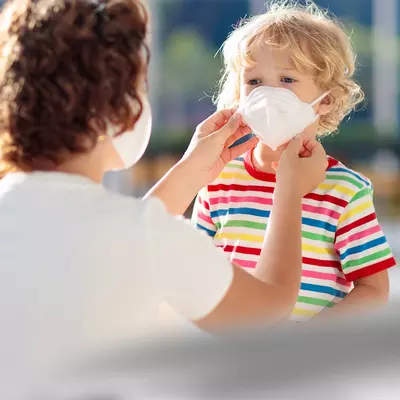- AdventHealth

If you or a loved has been diagnosed with Parkinson’s disease (PD), it’s important to get all the facts about the condition. Understanding PD can help you make more informed decisions about your care.
It’s also important to understand how coronavirus can affect people managing Parkinson’s, as well as their caregivers. We’ll tell you how to stay safe and healthy during this challenging time.
Understanding Parkinson’s Disease
Parkinson's disease is a degenerative disorder of the central nervous system. It progresses slowly, damaging nerve cells in the brain that produce dopamine to control movement and mood.
Named for 19th-century doctor James Parkinson, Parkinson's disease affects more than 1 million people in the U.S. Around 60,000 new cases are diagnosed each year.
Parkinson’s Disease Causes
The specific causes of Parkinson's disease remain unknown. The medical community's understanding is that Parkinson's develops from several risk factors including aging, genetic predisposition and environmental toxins.
Cases of early-onset Parkinson's are associated with heredity and have been linked to mutations in several genes.
Currently, there is much exciting and hopeful research happening in the field of Parkinson's and other movement disorders, as scientists search to pinpoint an exact cause.
Parkinson’s Disease Risk Factors
The disease affects about twice as many men as women. It usually begins around age 60, but some early-onset cases can occur earlier than 50 years old. There is also a rare form called juvenile parkinsonism, which appears before age 20.
Since the majority of people with Parkinson’s are in their senior years and may have compromised respiratory systems, they’re at an increased risk for coronavirus. If you have Parkinson’s or are caring for someone with the disease, take all the standard safety precautions for preventing COVID-19, including:
-
Carry and hand sanitizer
-
Practice social distancing
-
Stay home
-
Wash hands frequently
-
Wear a cloth mask when in a public place or around others
Parkinson’s Disease Treatments
Doctors have an array of treatments for Parkinson's disease, from medications to state-of-the-art surgical options to lifestyle modifications. The options are different for each patient, but the right treatment plan can greatly improve your quality of life if you’re managing this disease.
Maintaining Treatment for Parkinson's Disease During COVID-19
Since some people with Parkinson’s disease require medicine, regular health check-ups or medical procedures, it’s important to maintain this care during COVID-19. However, you’ll need to take special precautions to stay safe. That includes checking your medicines and making sure to reorder any that are running low.
You’ll also want to update your medication list and keep it handy. In the event you need emergency care or hospitalization due to COVID-19, doctors will need to know what types of Parkinson’s medications you’re taking to prevent dangerous drug interactions.
How We Protect You When You Need Care
If you or a loved one receives any home health care for Parkinson’s disease, know that our providers take all appropriate safety precautions like wearing masks and washing their hands thoroughly before, during and after each visit.
When you come to an AdventHealth facility for care, you can feel safe knowing that we’re taking enhanced safety measures for your protection during your visit. They include:
Universal Mask Use
We have no shortages of personal protective equipment (PPE) and masks are required for all at our facilities.
Temperature Checks
Have peace of mind that everyone you come into contact with has their temperature checked upon arrival. Every facility. Every time.
Social Distancing
Our new waiting room protocols are just one way that we’ve enhanced our measures to allow you to safely practice social distancing when you come for a visit.
Patient Cohorting
COVID-19-positive and symptomatic patients are carefully quarantined away from patients and visitors.
Visitor Limitation
By limiting the number of visitors — and making sure those allowed are screened for symptoms before being allowed to enter — we’re protecting your health.
The Importance of Exercise and Stress Management
Exercise and physical therapy often improve many symptoms of Parkinson’s disease. Physical activity can help maintain muscle strength, motor function and hand-eye coordination. It’s important not to let these healthy activities fall by the wayside during COVID-19.
Tips to stay safe and active include:
-
Doing virtual physical therapy sessions, if possible
-
Establishing a home exercise routine
-
Practicing social distancing
-
Wearing a mask if you go outside for exercise
It’s also important to manage stress during COVID-19. While this is true for everyone, it’s especially true for people managing Parkinson’s disease. Anxiety or depression can have negative effects on motor function. Psychological stress can even trigger disease progression or reduce the effectiveness of certain medicines. Stress relief techniques may include:
-
Deep breathing
-
Light stretching
-
Scheduled activities
-
Video visits with friends and family to reduce feelings of isolation
We Are Here to Help You
Have more questions about Parkinson's disease, or think you or a family member might benefit from an evaluation? Don’t delay seeking care from our Parkinson’s disease specialists.
You can also learn more about how we will help you and your family navigate the challenges of COVID-19 with added safety measures in place to protect you.



